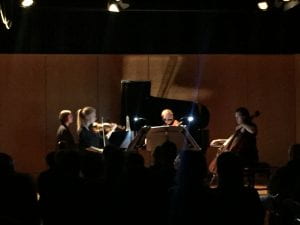At City, we have a great team of visiting instrumental and vocal teachers, many of whom also teach at the leading London conservatoires.
We also have two ensembles in residence, a large number of departmental ensembles and offer regular workshops and masterclasses with high-profile visiting performers and composers.
Read some short interviews with a selection of our visiting performance teachers.
Alena Walentin
Alena, could you start by telling us something about your current performance projects? I recently recorded my debut solo album and also a second album with my wind quintet Atéa. Both albums will be released later this year which I’m very much looking forward to! I will also will be recording with my chamber duo partner harpist Anne Denholm for a planned release next year. As well as recording, I have some masterclasses and performances coming up in Denmark, the USA and in the UK, including with Ian Pace at City! Right now, I’m in the middle of a tour of Wales with Mid-Wales Opera as part of the Ensemble Cymru playing Puccini’s Tosca. So some really exciting and enjoyable projects.
What is the highlight of your music teaching career so far? I feel that each conservatoire and university I teach at is unique and each offers a different but wonderful experience. When I was a student I had no idea that such an important part of my career would be teaching, but now I teach and give masterclasses in so many amazing places and I absolutely love it. I feel very humble and honoured to be teaching at City as well as at the Guildhall School of Music and Drama, Junior Royal Academy of Music and Royal Birmingham Conservatoire as well as giving masterclasses in different countries. I think sharing one’s knowledge is so important and it’s a very special, incredibly happy feeling when you hear your students progress and see that they enjoy playing the instrument!
What were the most important things you learned from your own teachers? It would be very hard to identify one single thing – they all together form one thing! Everything from intonation, the technical side of playing the instrument, posture, breathing, rhythm, dynamics etc are all incredibly vital to being able to express the composer’s intentions to its fullest. But if I had to pick the very most important thing, it would be the feeling that I’ve had from when I first started to play the instrument: that music always should come first, technique second. Instrumentalists, of course, need a flawless technique to be able to be professional, but the musical part should always take first place. When an audience member comes to a concert, they might not know much about the instrument and how hard certain passages or aspects of the playing might be. However, they feel the music! And if one can make them cry, laugh, smile from real enjoyment or bring back to them sacred memories – that is what it’s all about and is the reason why we learn the instrument. And that is why I always aspire to be a musician, an artist and not an instrumentalist. And I wish to all the students out there to remember why they love music so much and why they want to play the instrument.
Thank you very much for your time and good luck with your forthcoming tours!
You can find out more about Alena’s music at www.alenawalentin.com
Richard Uttley
Many thanks for joining us, Richard. Could you start by telling our students something about your current performance projects? One unusual project I’m particularly enjoying at the moment is playing Erik Satie’s ‘Entr’acte’ music from his ballet Relâche, which was written to accompany a silent film by René Clair. I’m playing it in the piano duet version with my friend and collaborator Kate Whitley, and we’re performing it live with the film. We spent a long time experimenting to work out how we could bring out as much subtle detail in the timing between the music and visuals as possible; it was a labour of love but that makes it so enjoyable for us to share the result with audiences. As well as being a pianist, Kate is also a composer and she’s writing me a piece that I premiered in a recital at City last spring. Other things I’ve got on the go this season include the Gershwin Piano Concerto, which I learnt over summer and played in the Queen Elizabeth Hall recently, and a cycle of all ten Beethoven sonatas for piano and violin for a tour in Scotland next month.
What is the most exciting country you’ve played in? I’ve toured in China several times in recent years, and have given recitals in over twenty cities there. I didn’t get to spend a long time in any of them, but to play and travel in a totally different culture was a great experience and one I feel very lucky to have had through music.
What is the most memorable concert or other musical event that you have attended? It was a concert at LSO St Luke’s (just round the corner from City, in fact) that was part of a Barbican festival in 2007 focussed on the music of Thomas Adès. I wasn’t living in London at the time but made a special trip to attend this concert as I was obsessed with Adès’s music back then. The concert included, amongst other things, the composer himself playing his mesmerising Traced Overhead (I had no idea until then what an incredible pianist as well as composer Adès is), and a very starry Les Noces, with Peter Donohoe, Rolf Hind and Katia and Marielle Labèque on the four pianos and an amazing group of Russian singers called the Pokrovsky Ensemble. If I could go back in time to hear concerts again I’d go to that one every week!
What would you most recommend students do beyond practising their instrument/voice and rehearsing? Make the most of being in London. If you come to study at City you’ll be in the heart of an incredibly vibrant city, with world class food, theatre, concerts, museums and galleries – to name but a few – and this is a great opportunity to have experiences that will stay with you for a lifetime. Students get cheap tickets too!
Thank you!
Listen to some of Richard’s music: https://soundcloud.com/richard_uttley/chris-willis-burning-up
Madeleine Mitchell
Many thanks for joining us, Madeleine. Could you start by telling us about your current performance projects? I’ve just completed a 3-week tour of the USA which included three performances of the Brahms Double Concerto and two concerts in San Francisco – a trio concert and my recital programme ‘A Century of British Music’ ranging from Elgar and John Ireland to Grace Williams (1906-77) and a piece written for me in 1993 by Michael Nyman. In coming weeks, I’m focusing on Grace Williams’ Violin Sonata in several concerts, coinciding with the release by Naxos of my latest album of her chamber music, all premiere recordings, with my London Chamber Ensemble, recorded here in the Performance Space at City. In fact, we held the album release at City last year at City.
What is the most exciting place you’ve performed in? I’ve played in over 50 countries so there are many exciting places to choose from, including the extraordinary German Cultural Centre in Madagascar (at the invitation of the British Ambassador), the Sydney Opera House and representing the UK at a festival of British Culture in the Lincoln Center, New York just after 9/11. New York is particularly dear to my heart since I was a Fulbright/ITT Fellow there years ago.
What were the most important things you learned from your own teachers? (a) that to be a complete musician, you have to be open to the other arts; (b) that your body is your instrument; (c) that, as the great Jascha Heifetz put it: ‘to be a great artist you need the nerves of a bullfighter and the concentration of a buddhist monk’
Madeleine Mitchell is a leading international violinist, who has performed as soloist and chamber musician in over 50 countries, including with major orchestras. She has made many recordings, some of which have been nominated for BBC Music Awards, and has collaborated with composers including James MacMillan and Michael Nyman. As well as teaching at City, University of London, Madeleine is also a Professor at the Royal College of Music
Thank you very much for your time!
Find our more about Madeleine’s work at: www.madeleinemitchell.com
Shirley Smart
Thanks for joining us today, Shirley. Could you start by telling us something about your current performance projects? Sure. I am currently performing with my trio/quartet, with whom I recently released my first album, ‘Long Story Short’. We have quite a few performances this year, and hopefully a tour next spring. I’m also writing material for my next album, although that may take a while to be ready for performance! Long Story Short is available here: Long Story Short
Other projects which I lead/co-lead are a duo with reeds player James Arben – this is a freely improvised project, mostly as a duo, but sometimes with guests. We have recorded quite a bit of music recently, so may well release an EP or an album with that.
I also have a jazz string trio with violinists Matt Holborn and Richard Jones. This is a relatively new project that we have been trying to put together for about 2 years. The three of us felt that string players in jazz often get overlooked. Matt and Rich are both amazing jazz violinists, but also very different players so it’s an interesting balance.
Another group I play in is Issie Barratt’s band Interchange, which is an all-female dectet that she founded in 2016, in order to address the imbalance of gender in the jazz world. We were all commissioned to write a work for the group, and the album ‘Donna’s Secret’ was released earlier this year.
My final, and one of my favourite bands ever, is the trio ‘Sawa’, with vocalist Alya Al-Sultani and pianist Clemens Poetzch. This was founded in about 2015, and is a unique synthesis of Iraqi folk music, jazz, chamber music and free improvisation. As Clemens lives in Germany, we don’t get to play together that often, but I love it when we do! Our EP is here : Sawa EP
What is the most exciting country/venue/space that you have played at? I suppose, having lived in Jerusalem for 10 years, that would have to count in its entirety as the most exciting (and challenging) place to have existed musically in. It was incredibly fertile and I was involved in all sorts of things, from jazz to classical Arabic and Turkish music, all of which inform my musical activities now.
What is the highlight of your teaching career so far? It’s difficult to pin-point one particular thing, as I get different things out of different contexts, and they all present different challenges! I really enjoy teaching at the RCM Junior Department, where I do a lot of improvisation work, since this is very marginalised in classical education – although I think it is better than it was 15 or so years ago.
A couple of particular highlights were a workshop I gave for Jazzlines in Birmingham a few years ago – the students were so keen and eager to learn! We worked on a North African tune completely by ear, and performed it at the end of the session in the Symphony Hall Foyer. The group included Xhosa Cole, who recently won the BBC Young Jazz Musician of the Year. He came up at the end and extracted a list of everything I knew about world music – he was so keen to absorb everything he could, which is an absolutely fantastic attitude to have!!
What would you recommend students do beyond practising their instrument/voice and rehearsing? Learn to use your time well. And be on time for things. The music profession, especially the session world, is very highly time-constrained, and being on time is a central part of your professionalism and a really good habit to get into early. So much is about taking responsibility for yourself, being respectful to others, and learning to discuss any issues – musical or otherwise – calmly and professionally as well.
My website is here : Shirley Smart
Thank you very much and good luck with your forthcoming projects!


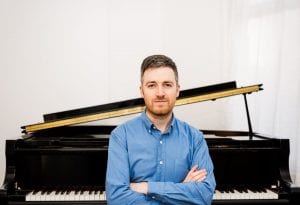

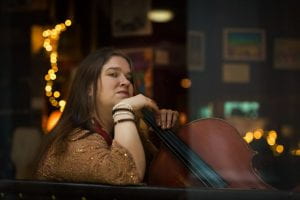



















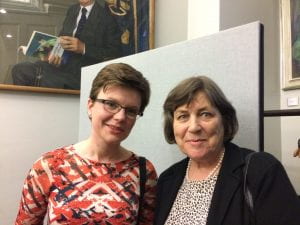



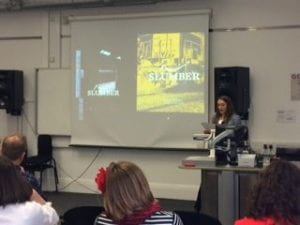

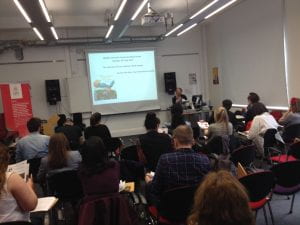

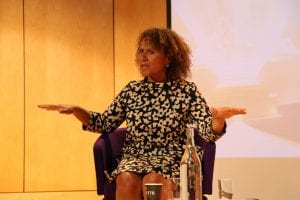
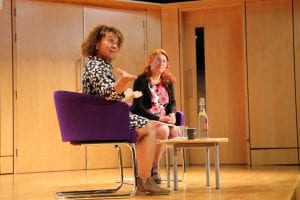
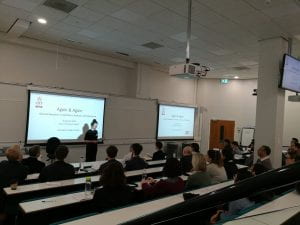

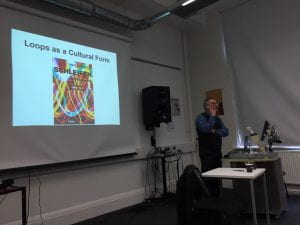 .
. 